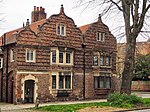YO1 Radio
Community radio stations in the United KingdomRadio stations established in 2017Radio stations in YorkshireUse British English from July 2023

YO1 Radio is a community radio station based in York, England. It broadcasts local news, weather, travel and information alongside music from the 1980s to the present day. It broadcasts to the city of York on 102.8 FM, in Selby on 90.0 FM with transmissions in the surrounding parts of North Yorkshire on DAB+. It takes its name from a district of the YO postcode area covering central York.
Excerpt from the Wikipedia article YO1 Radio (License: CC BY-SA 3.0, Authors, Images).YO1 Radio
Marsden Park, York Clifton Moor
Geographical coordinates (GPS) Address Nearby Places Show on map
Geographical coordinates (GPS)
| Latitude | Longitude |
|---|---|
| N 53.9864 ° | E -1.0992 ° |
Address
Marsden Park
Marsden Park
YO30 4WX York, Clifton Moor
England, United Kingdom
Open on Google Maps






